- Last Updated: January 15th, 2026
Key Takeaways
PFAS contamination at military installations has exposed service members and their families to serious health risks, including kidney cancer, testicular cancer, ulcerative colitis, thyroid disease, and pregnancy complications.
Studies suggest that PFAS chemicals may promote kidney cancer by inducing oxidative stress, altering gene expression, disrupting hormonal signaling, and suppressing the immune system.
TruLawsuit Info connects kidney cancer victims exposed to PFAS with experienced attorneys who work on a contingency fee basis to help them seek justice and compensation for medical expenses, lost wages, pain and suffering, and other damages.
Overview of the PFAS Kidney Cancer Lawsuit
On this page, we’ll provide an overview of the PFAS kidney cancer lawsuit, links between PFAS exposure and kidney cancer, how to file a PFAS kidney cancer lawsuit, and much more.

Intro to the PFAS Kidney Cancer Lawsuit
Key aspects of the PFAS kidney cancer lawsuit include, but are not limited to:
- Military personnel and families exposed to PFAS chemicals from contaminated water at bases may be at higher risk for kidney cancer and other health issues.
- Those diagnosed with kidney cancer after PFAS exposure may have legal grounds to file a lawsuit against the chemical manufacturers seeking compensation for damages.
- TruLawsuit Info connects PFAS kidney cancer victims with experienced attorneys working on contingency (no fees unless they win) to help them seek justice through the legal process.
If you or a loved one has been diagnosed with kidney cancer after being exposed to PFAS chemicals at a military installation, you may be eligible for compensation.
Contact TruLawsuit Info using the chat on this page to receive an instant case evaluation to see if you qualify to file a PFAS kidney cancer lawsuit.
PFAS Exposure Risks at Military Installations
The widespread use of PFAS chemicals at military bases across the U.S. has led to significant PFAS contamination of drinking water supplies, exposing service members and their families to serious health risks.
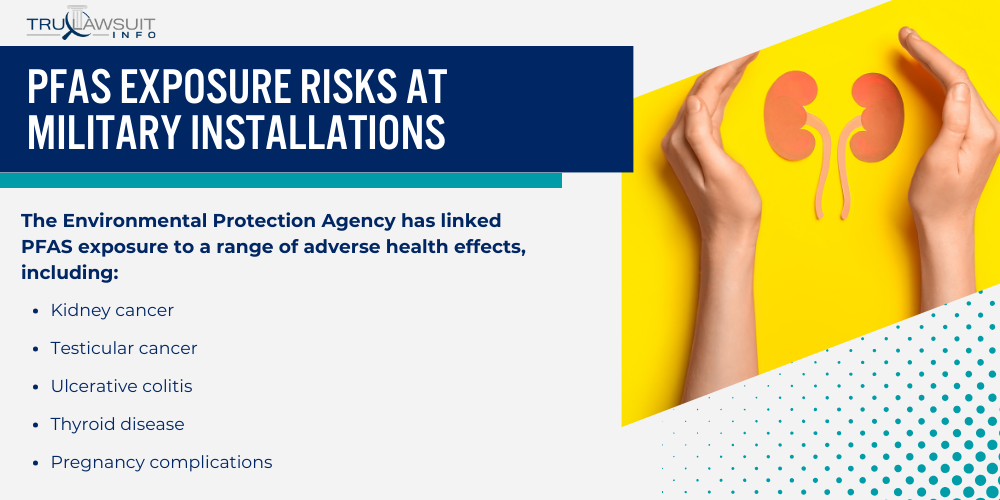
The primary sources of PFAS at these installations include aqueous film-forming foam (AFFF) used in training exercises and actual emergencies.
Sources and Scope of PFAS Contamination at Military Installations
PFAS contamination has been detected at hundreds of military sites, with the Centers for Disease Control (CDC) finding some of the highest levels in groundwater and contaminated drinking water wells.
The Department of Defense estimates that the cost of cleaning up PFAS chemicals at its installations could exceed $2 billion.
The Environmental Protection Agency has linked PFAS exposure to a range of adverse health effects, including:
- Kidney cancer
- Testicular cancer
- Ulcerative colitis
- Thyroid disease
- Pregnancy complications
Military personnel and their families living on or near contaminated bases face a heightened kidney cancer risk due to exposure to PFAS.
Health Risks Tied to PFAS Exposure in Military Settings
Studies have linked PFAS exposure to a range of health problems, including kidney cancers, testicular cancer, ulcerative colitis, thyroid disease, and pregnancy complications.
Military personnel and their families living on or near contaminated bases face a heightened risk of these conditions.
Service members exposed to PFAS may develop serious health conditions that impact their ability to serve and their quality of life.
Renal cell carcinoma, in particular, can be an aggressive and life-threatening kidney cancer diagnosis.
Family members living on or near contaminated military installations can also be exposed to PFAS through contaminated drinking water, soil, and even household dust.
Children may be especially vulnerable to the adverse health effects of these toxic chemicals.
Connecting PFAS Exposure to Kidney Cancer
A growing body of research has established a link between exposure to PFAS and an increased risk of developing kidney cancer.
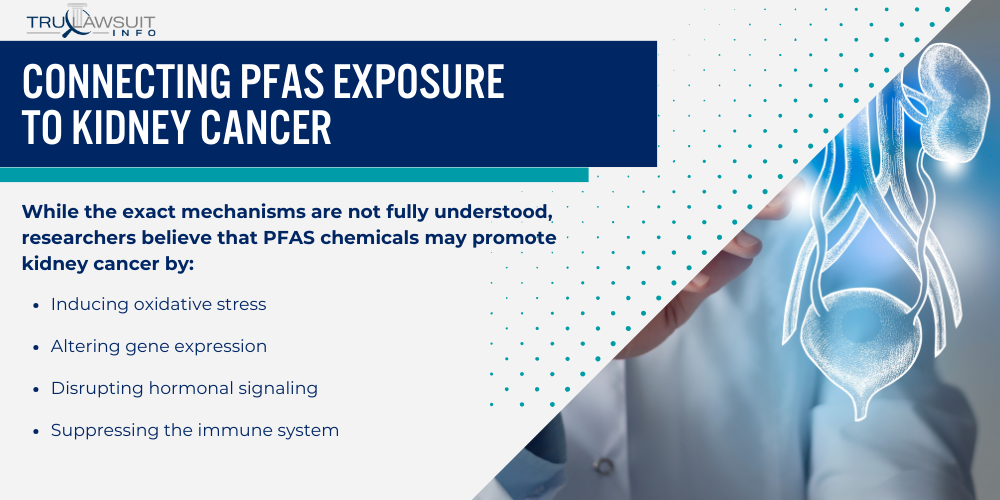
Studies suggest that these forever chemicals can accumulate in the kidneys and cause long-term damage.
Research Linking PFAS to Kidney Cancer
Several epidemiological studies have found higher rates of kidney cancer among populations exposed to PFAS, including military personnel and residents of contaminated communities.
A 2012 study of nearly 70,000 people in the Mid-Ohio Valley found that those with the highest PFOA exposure had a two-fold increased risk of kidney cancer.
While the exact mechanisms are not fully understood, researchers believe that PFAS chemicals may promote kidney cancer by:
- Inducing oxidative stress
- Altering gene expression
- Disrupting hormonal signaling
- Suppressing the immune system
Biological Mechanisms of PFAS-Induced Kidney Cancer
While the exact mechanisms are not fully understood, researchers believe that PFAS chemicals may promote kidney cancer by inducing oxidative stress, altering gene expression, and disrupting hormonal signaling.
These toxic chemicals may also suppress the immune system, making it harder for the body to fight off cancer cells.
Military personnel and others who have developed kidney cancer after exposure to PFAS may have legal grounds to file a PFAS lawsuit against the manufacturers of these chemicals.
In these cases, plaintiffs typically allege that the companies knew about the health risks of PFAS but failed to warn consumers or regulators.
Legal Grounds for PFAS Kidney Cancer Lawsuits
Military personnel and others who have developed kidney cancer after PFAS exposure may have legal grounds to file a PFAS kidney cancer lawsuit against the manufacturers of these chemicals.
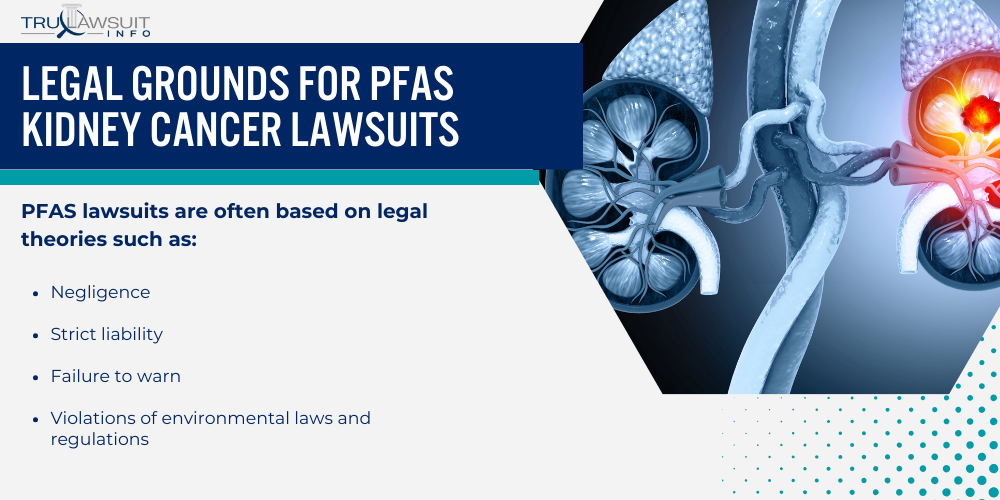
In these cases, plaintiffs typically allege that the companies knew about the health risks of PFAS but failed to warn consumers or regulators.
Legal Justifications for Suing Over PFAS Exposure
Individuals who develop health issues from PFAS exposure can pursue lawsuits based on various legal theories.
These theories often include negligence, strict liability, and failure to warn about the dangers of PFAS chemicals.
PFAS lawsuits are often based on legal theories such as:
- Negligence
- Strict liability
- Failure to warn
- Violations of environmental laws and regulations
Notable Outcomes from Previous PFAS Lawsuits
Previous PFAS lawsuits have resulted in significant settlements and verdicts.
These outcomes demonstrate companies’ accountability for the harmful effects of PFAS exposure.
Examples of notable PFAS lawsuit outcomes include:
- In 2017, DuPont and Chemours agreed to pay $671 million to settle thousands of PFAS lawsuits related to PFOA contamination in the Mid-Ohio Valley.
- In 2020, a jury awarded $50 million to a man who developed testicular cancer after exposure to PFAS in AFFF firefighting foam lawsuits.
If you or a loved one have been diagnosed with kidney cancer after being exposed to PFAS, you may be eligible to file a PFAS kidney cancer lawsuit seeking compensation for your damages.
An experienced PFAS attorney can help you navigate the legal process and build a strong case.
Filing a PFAS Kidney Cancer Lawsuit
If you or a loved one have been diagnosed with kidney cancer after being exposed to PFAS, you may be eligible to file a PFAS kidney cancer lawsuit seeking compensation for your damages.
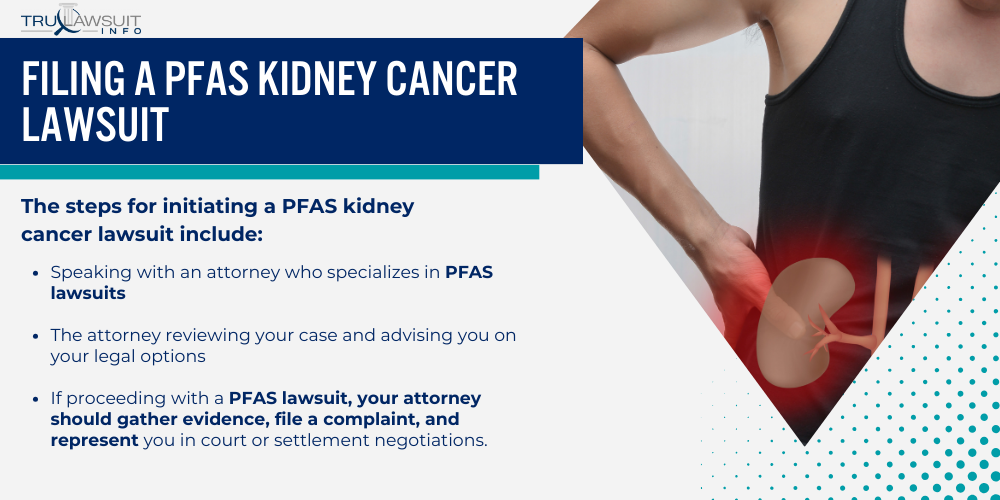
An experienced PFAS attorney can help you navigate the legal process and build a strong case.
Steps for Initiating a PFAS Kidney Cancer Lawsuit
Initiating a PFAS kidney cancer lawsuit involves several important steps.
First, it’s essential to understand your legal rights and gather all necessary documentation related to your exposure and diagnosis.
The steps for initiating a PFAS kidney cancer lawsuit include:
- Speaking with an attorney who specializes in PFAS lawsuits
- The attorney reviewing your case and advising you on your legal options
- If proceeding with a PFAS lawsuit, your attorney should gather evidence, file a complaint, and represent you in court or settlement negotiations.
To build a strong PFAS kidney cancer lawsuit, you will need to provide evidence of your PFAS exposure and your medical diagnosis.
This may include military service records, water testing results, medical records, and expert testimony.
Evidence and Documentation for a PFAS Kidney Cancer Lawsuit
To build a strong PFAS kidney cancer lawsuit, you will need to provide evidence of your exposure to PFAS and your medical diagnosis.
This may include military service records, water testing results, medical records, and expert testimony.
While PFAS lawsuits have the potential for significant settlements or verdicts, these cases can also be complex and challenging.
Defendants in these cases, which are typically large chemical companies, often have deep pockets and armies of lawyers to fight the claims.
Challenges and Legal Defenses in PFAS Lawsuits
While PFAS lawsuits have the potential for significant settlements or verdicts, these cases can also be complex and challenging.
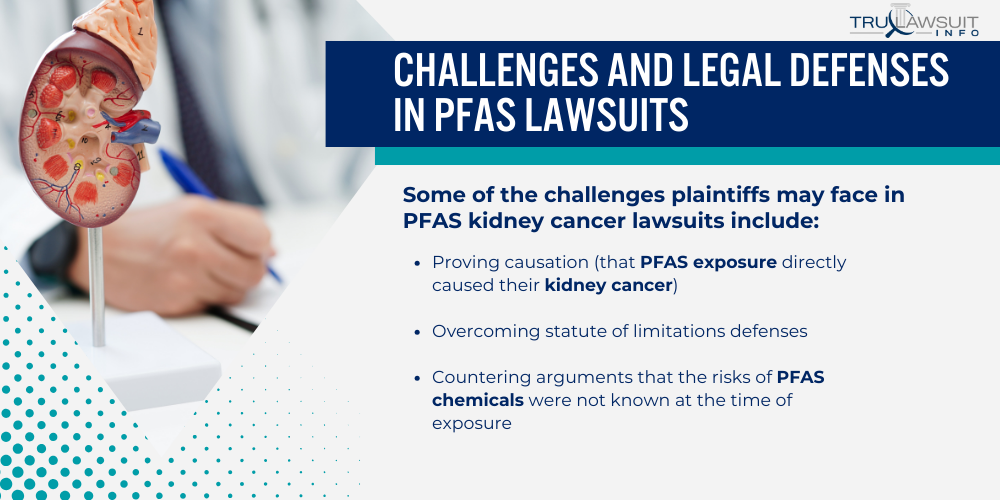
Defendants in these cases, which are typically large chemical companies, often have deep pockets and armies of lawyers to fight the claims.
Common Obstacles in PFAS Kidney Cancer Lawsuits
Plaintiffs in PFAS kidney cancer lawsuits often encounter several hurdles.
These challenges can complicate the legal process and affect the case outcome.
Some of the challenges plaintiffs may face in PFAS kidney cancer lawsuits include:
- Proving causation (that PFAS exposure directly caused their kidney cancer)
- Overcoming statute of limitations defenses
- Countering arguments that the risks of PFAS chemicals were not known at the time of exposure
PFAS manufacturers may argue that they followed all applicable laws and regulations, that the risks of PFAS chemicals were not fully understood, or that plaintiffs’ cancers were caused by other factors such as smoking or genetics.
They may also try to shift blame to other parties, such as the military or water utilities.
Defense Strategies Used by PFAS Manufacturers
PFAS manufacturers may argue that they followed all applicable laws and regulations, that the risks of PFAS chemicals were not fully understood, or that plaintiffs’ cancers were caused by other factors such as smoking or genetics.
They may also try to shift blame to other parties, such as the military or water utilities.
As awareness of the health risks of PFAS chemicals grows, so does the pressure on regulators and lawmakers to take action.
In the coming years, we can expect to see more stringent regulations on PFAS and a continued surge in PFAS lawsuits against manufacturers.
Future Regulation and Legal Trends for PFAS
As awareness of the health risks of PFAS chemicals grows, so does the pressure on regulators and lawmakers to take action.
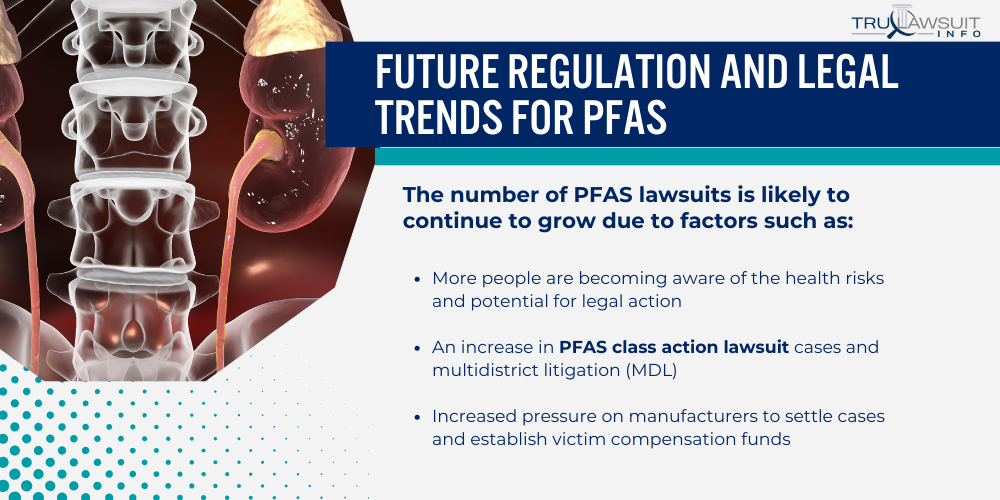
In the coming years, we can expect to see more stringent regulations on PFAS and a continued surge in PFAS lawsuits against manufacturers.
Current and Upcoming Regulations on PFAS
Several states have already passed laws to regulate or ban certain PFAS chemicals, and the federal government is considering similar measures.
In 2022, the Environmental Protection Agency released new health advisories for PFOA and PFOS, setting the safe level for these forever chemicals in drinking water at near zero.
The number of PFAS lawsuits is likely to continue to grow due to factors such as:
- More people are becoming aware of the health risks and potential for legal action
- An increase in PFAS class action lawsuit cases and multidistrict litigation (MDL)
- Increased pressure on manufacturers to settle cases and establish victim compensation funds
Future Legal Trends in PFAS Litigation
As more people become aware of the health risks of PFAS chemicals and the potential for legal action, the number of PFAS lawsuits is likely to continue to grow.
We may also see more PFAS class action lawsuit cases, multidistrict litigation (MDL), and increased pressure on manufacturers to settle cases and establish victim compensation funds.
At TruLawsuit Info, we connect kidney cancer victims exposed to PFAS with experienced attorneys who can help them seek justice and compensation.
Our network of lawyers has a proven track record of success in PFAS lawsuits and is dedicated to fighting for the rights of those harmed by these toxic chemicals.
TruLawsuit Info: Maximizing Your PFAS Kidney Cancer Lawsuit Settlement
At TruLawsuit Info, we connect kidney cancer victims exposed to PFAS with experienced attorneys who can help them seek justice and compensation.
Our network of lawyers has a proven track record of success in PFAS lawsuits and is dedicated to fighting for the rights of those harmed by these toxic chemicals.
Compensation Types for PFAS Kidney Cancer Victims
If you have been diagnosed with kidney cancer after exposure to PFAS, you may be entitled to compensation for your medical expenses, lost wages, pain and suffering, and other damages.
In some cases, punitive damages may also be available to punish manufacturers for particularly egregious conduct.
Our attorneys work on a contingency fee basis, meaning you pay nothing upfront and only a fee if they win your case.
To get started, fill out our online form or call our toll-free number for a free, no-obligation case evaluation.
Let us help you hold PFAS manufacturers accountable and secure the compensation you deserve.
Contingency Fee Basis: Instant Case Evaluation
Our attorneys work on a contingency fee basis, meaning you pay nothing upfront and only a fee if they win your case.
To get started, simply fill out our online form or call our toll-free number for a free, no-obligation case evaluation.
Let us help you hold PFAS manufacturers accountable and secure the compensation you deserve.
Frequently Asked Questions
-
The primary sources of PFAS contamination at military installations include the use of aqueous film forming foam (AFFF) in training exercises and actual emergencies.
This has led to significant PFAS contamination of drinking water supplies, exposing service members and their families to serious health risks.
-
Studies have linked PFAS exposure to a range of health problems, including kidney cancer, testicular cancer, ulcerative colitis, thyroid disease, and pregnancy complications.
Military personnel and their families living on or near contaminated bases face a heightened risk of these conditions.
-
While the exact mechanisms are not fully understood, researchers believe that PFAS chemicals may promote kidney cancer by inducing oxidative stress, altering gene expression, and disrupting hormonal signaling.
These toxic chemicals may also suppress the immune system, making it harder for the body to fight off cancer cells.
-
Military personnel and others who have developed kidney cancer after PFAS exposure may have legal grounds to file a PFAS kidney cancer lawsuit against the manufacturers of these chemicals.
An experienced PFAS attorney can help navigate the legal process and build a strong case seeking compensation for damages.
-
TruLawsuit Info connects kidney cancer victims exposed to PFAS with experienced attorneys who can help them seek justice and compensation.
Their network of lawyers works on a contingency fee basis, meaning clients pay nothing upfront and only pay a fee if the case is won.

Attorney Jessie Paluch, founder of TruLawsuit Info, has over 25 years of experience as a personal injury and mass tort attorney, and previously worked as an international tax attorney at Deloitte. Jessie collaborates with attorneys nationwide — enabling her to share reliable, up-to-date legal information with our readers.
Legally Reviewed
This article has been written and reviewed for legal accuracy and clarity by the team of writers and legal experts at TruLawsuit Info and is as accurate as possible. This content should not be taken as legal advice from an attorney. If you would like to learn more about our owner and experienced injury lawyer, Jessie Paluch, you can do so here.
Fact-Checked
TruLawsuit Info does everything possible to make sure the information in this article is up to date and accurate. If you need specific legal advice about your case, contact our team by using the chat on the bottom of this page. This article should not be taken as advice from an attorney.
You can learn more about the PFAS Contamination Lawsuit by visiting any of our pages listed below:
Here, at Tru Lawsuit Info, we’re committed to helping victims get the justice they deserve.
To do this, we actively work to connect them with attorneys who are experts in litigating cases similar to theirs.
Table of Contents
Tru Lawsuit Info is a reliable source of information about issues that may affect your health and safety, such as faulty products, data breaches, and environmental hazards.
Our team of experienced writers collaborates with medical professionals, lawyers, and advocates to produce informative articles, guides, and other resources that raise awareness of these topics.
Our thorough research provides consumers with access to reliable information and updates on lawsuits happening around the country. We also can connect consumers with attorneys if they need assistance.
Here, at Tru Lawsuit Info, we’re committed to helping victims get the justice they deserve.
To do this, we actively work to connect them with attorneys who are experts in litigating cases similar to theirs.
